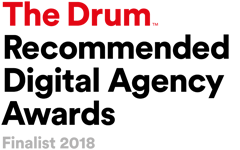How important is a digital marketing strategy? Do I really need one and how much will it probably cost me? Is it one of those buzzwords that might cost a lot in upfront investment and not actually show results?
The primary issue is if you don’t understand and really know about digital marketing, digital marketing strategies or digital marketing fundamentals, then the chances are it’s very hard to know where you stand with your own digital strategy.
Believe it or not, it genuinely benefits us if our clients have a good understanding of digital marketing. We don’t expect our clients to be experts – that’s our job. However if our clients have some understanding of digital marketing and the fundamentals of the concepts that we’re applying as an agency, our clients are better able to help us help them further. Combining their specific area of expertise with our digital marketing expertise, we make a strong marketing team.
What we’ll cover:
- Let’s get started – what is a digital marketing strategy?
- Well, what about the costs involved?
- OK, so what is digital marketing supposed to do exactly?
- How would I get started with initial digital marketing types of content?
- What are some basic digital marketing types & tactics?
- More advanced tactics
- Our key digital marketing strategy take outs from this article
Let’s get started – what is a digital marketing strategy?
Simply it’s a plan that you’re putting in place in order to reach your goals using online/digital mediums/formats.
Another way of looking at this is, is that it would be quite foolish to start a new business without a plan in place, right? Once you set up your business and you’ve started trading, you then learn along the way about things that are working well and things that aren’t working well. By your second year of trading, you would have adapted your plans slightly, based on what you’ve learned.
Digital marketing is no different in approach to other planning – the foundational knowledge and experience is what you need
All of your planning efforts might be great, however, only experience will tell you what works and what doesn’t work. This means that your digital strategy will change and be refined as time goes on.
An understanding of social channels and an understanding of other digital mediums and digital tactics might be experiences that a consultant can give you. Anyone worth their fees when offering to help you with their digital skills, will be thoroughly meaning things to you and teach you along the way.
Well, what about the costs involved?
One beautiful thing about digital marketing is the proof of return on investment (ROI). With digital marketing, there’s no hiding. Almost every aspect is quantifiable with numbers. You can actively see just how many people are visiting your website, where those visitors are coming from, and how many more people are following you on social media. You can even where you are positioned in search engine results, based on certain keywords you would like to appear for.
All of this is to say, you can learn pretty quickly if someone who is doing your digital marketing for you is not doing a good job!
Going back to digital marketing strategies – a good job is largely dependent on the strength of the original digital strategy… so this isn’t something you should overlook. It will help you know where you stand with whoever is offering you help with your digital marketing.
Digital marketing strategy consultant costs
Some consultants and freelancers charge by the hour which could be £50 – £400+ in the marketing industry! A good guide is:
- Marketing degree or professional/regulated accreditation, with 2+ years relevant experience, £25-£45 per hour
- Marketing degree or professional/regulated accreditation, or related discipline with 6+ years relevant experience, perhaps £50 – £80 per hour. Maybe they have awards too at this point.
- Previous marketing director, 10+ years relevant experience (degree or no degree), £90-£150 per hour. They can clearly state their achievements and the results they will bring and how quickly.
- No marketing degree and fairly limited experience – approach with caution! Would you hire a lawyer with no law degree but has taken on their own legal case before? Would you hire a self-taught accountant with a few years of experience for your tax returns? Just some things to consider…
OK, so what is digital marketing supposed to do exactly?
To have the strongest chances of success when communicating through digital means (i.e. blogs, your website, social media, etc), your digital marketing strategy should focus on four specific areas:
- Setting some rough goals, objectives, and key performance indicators (KPIs)
- What are you wanting to achieve? For example, you want to collect email addresses so you can start doing email marketing, or perhaps you want to sell products online, or recruit more staff through your website and social media
- Understanding and defining your audience
- Who are you trying to reach and target: potential candidates to employ, customers and or other organisations and stakeholders or investors?
- Creating and implementing your digital marketing strategy
- Which digital marketing tactics will be used in your overall strategy? Email marketing, blogs so you can use keywords to appear higher up in search engine results, social media, reaching out to other organisations online and asking them to link to your website (creating backlinks)? Perhaps you’ll also use budget to spend on advertising campaigns online? The strategy is how you will apply a range of digital tactics to achieve your objectives
- Auditing and improving your marketing campaigns
- Follow those numbers, see what patterns they create and learn how to tweak, adjust and improve! A digital marketing strategy needs to be given enough time to see some results, but it should not be a static thing, it should be continually monitored and reviewed.
How would I get started with initial digital marketing types of content?
In ANY strategy, you do the following:
- you identify your challenge
- then form a planned overview of how you’ll deal with the challenge
- you list some specific actions needed to accomplish the plan
Once this is complete
IMPORTANTLY, you need to identify who exactly you are trying to reach online. We recommend doing some customer/client/candidate profiling for this. We highly recommend that if you’re doing this alone, you use this HubSpot template. We’re an official HubSpot partner and they really do have some great supporting documents – for free!
Then whilst you’re completing your customer/client/candidate profiles, you very broadly outline some ‘types’ of customers/clients/candidates of yours that you want to target.
Once you have a clear idea of who you’re speaking to (or trying to!) you can start to think about where exactly they spend their time and how you can be in those places too…
Next, you will develop content which could include; images, videos, ebooks, blogs, etc. They essentially need to be pieces of interesting content that seek to:
- Attract their attention
- Is in some way fascinating to that customer/client/candidate
- Discusses a problem or challenge they might have
- Offer a solution to the problem or challenge you’ve just identified
These are the basic principles! We’ll then get into the digital marketing types, tips and tactics…
What are some basic digital marketing types & tactics?
- Publishing a blog
- Offering free educational resources
- You can advertise on specific social media platforms (e.g. Facebook Ads, Instagram Ads).
- Creating a giveaway and/or competition
- Test different campaign types to determine what works best for your target audience
- Host a webinar or other live event – marketing it online
- You could create your own podcast.
- Email campaigns
More advanced tactics
- Digital Listening / Keyword Research
- Auditing your competitors & benchmarking your company against theirs
- Search engine optimising your digital content
- Automating your email campaigns
- Advanced A/B testing
- Ensuring your NAP Profile is accurate
- Building a backlink profile (credible websites linking to your website)
- Cleaning & clearing your backlinks
- Being featured on other people’s (non-competing) blogs
- Forming digital brand partnerships
- Social media influencer campaigns & tests
The list really does go on! We’ll soon be posting about digital marketing fundamentals & why digital marketing is important. Watch this space!
If you require any help, please don’t hesitate to get in touch with us:
[hubspot portal=”7845766″ id=”fcdbeb91-4f55-424e-9c24-59bfb4908735″ type=”form”]Our key digital marketing strategy take outs from this article
Simply put, it’s a plan that you’re putting in place in order to reach your goals with your target audience, using online/digital mediums/formats.
One beautiful thing about digital marketing is the proof of return on investment (ROI). With digital marketing, there’s no hiding. Almost every aspect is quantifiable with numbers.
A useful guide is:
– Marketing degree or professional/regulated accreditation, with 2+ years relevant experience, £25-£50 per hour
– Marketing degree or professional/regulated accreditation, or related discipline with 6+ years relevant experience, perhaps £65 – £80 per hour. Maybe they have awards too at this point.
– Previous marketing director, 10+ years relevant experience (degree or no degree), £90-£150 per hour. They can clearly state their achievements and results they will bring and how quickly
Not exactly – but – if you’re commissioning someone with no marketing degree or industry accreditation – approach with caution! Would you hire a lawyer with no law degree but has taken on their own legal case before? Would you hire a self-taught accountant with a few years of experience for your tax returns? Just some things to consider… qualifications aren’t everything, but with experience only, it’s hard to judge someone’s foundational understanding of broader, important principles and strategies.
Engage your target audience, through digital means. So, set objectives, goals and key performance indicators. Then, truly understand who you’re targeting so you’re doing it most effectively. Create and implement content & scheduling plan that will attract and engage them, publishing in places where your target audience will be present. Measuring, auditing yourself and competitor activity and improving your own strategy.
In ANY strategy, you do the following:
1. you identify your challenge
2. then form a planned overview of how you’ll deal with the challenge
3. you list some specific actions needed to accomplish the plan









